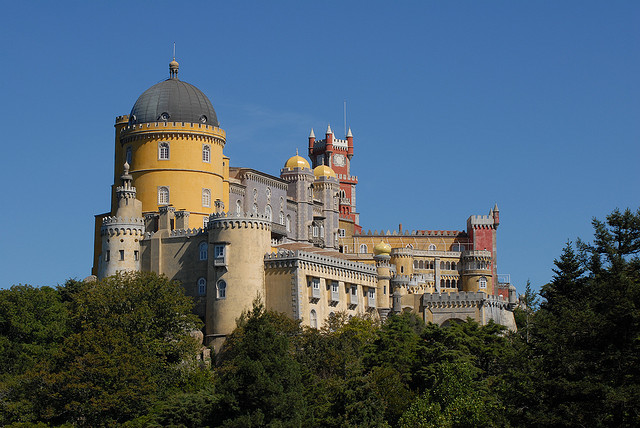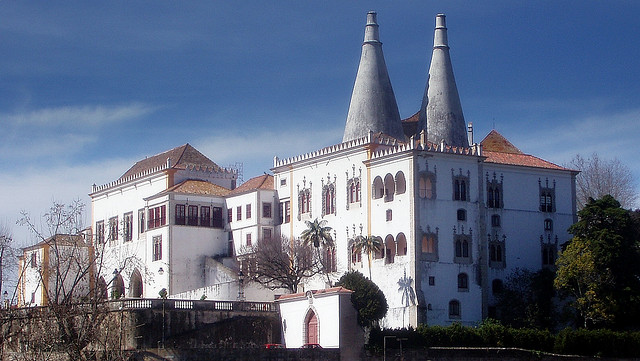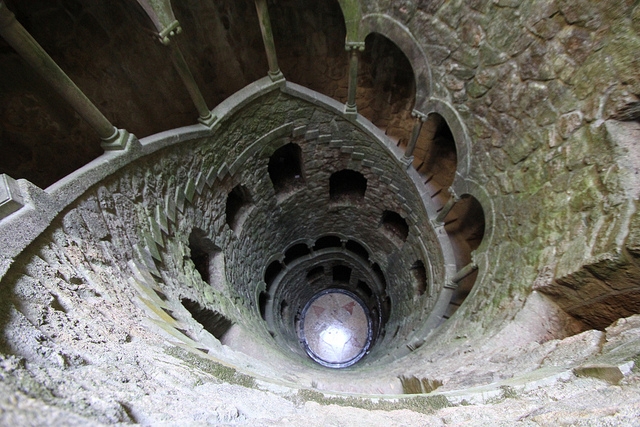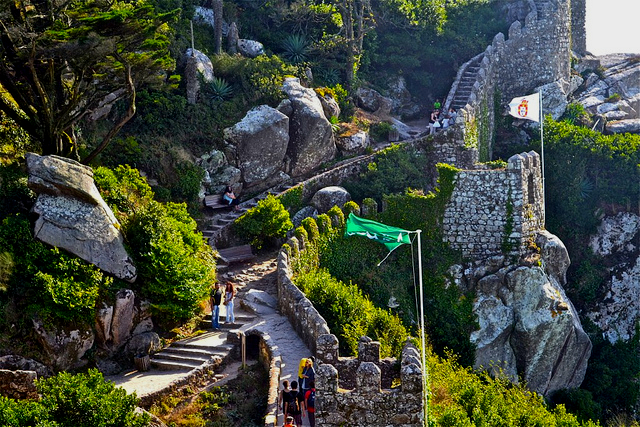Sintra monuments are one of the highlights of the most romantic of the Portuguese villages. Tourists come looking for the postcard breathtaking landscape immortalized by Lord Byron has ‘glorious Eden’ and classified as World Heritage Site in 1995 by UNESCO.
The natural beauty of Sintra alone would grant it the title of one of the most wonderful villages in the world. Of course, the many gorgeous Sintra monuments enhance the natural landscape by giving it also an historic relevance.
The magnificent Sintra monuments
The village is embellished by countless dazzling manor houses but of course what catch our eyes are the famed Sintra monuments.
Pena Palace
Pena Palace is probably the most iconic monument in Sintra. The vivid colors of its walls, rising from the green landscape surrounding, work as a visiting card not just from Sintra but also from Portugal.

Photo by FH Mira
The palace, inspired by the Bavarian palaces, namely by the Neuschwanstein castle, takes us to a Disney-like ambience. Built under the orders of Don Fernando, the husband of Queen Mary II, Pena Palace is one of the most important examples of the Romantic style of the 19th century. The palace’s grandiosity is reinforced by the opulent decoration.
As magnificent are also its gardens, therefore after visiting the palace take a time to enjoy Pena Park.
Moors castle
Moors castle is one of the most ancient monuments in Sintra. As its name indicates, it was built by the Moors and after changing hands a few times, it was definitely conquered by the first Portuguese king, Afonso Henriques.
Photo by All About Portugal
The ruins of the Romanesque church of Saint Peter also testify the historic importance of the place. By the church there is an ancient cemetery. The archeological works carried out so far revealed highly interesting findings. Visitors may observe some skeletons.
Sintra National Palace
Sintra stands right at the village center. However, everyone identifies it from a far due to the two remarkably high chimneys. Inside, the huge kitchens and the impressive chapel charm visitors. After all, the chapel’s walls present some of the most ancient and wonderful collection of Hispanic-Moorish glazed tiles.

Photo by FlickrDelusions
The National Palace offers one of the most curious legends linked to the monuments in Sintra. The floor by the window of the room where mad king Afonso VI was imprisoned for six years is worn. People say that the king is responsible for this because he kept going back and forth on the same path.
Monserrate Palace
The incredible Monserrate Palace conquered its impressive look after being recovered according to the neo-Moorish style in 1856. Fortunately these recovery works put an end to years of abandonment.
Monserrate is considered by many as the most romantic of all monuments in Sintra. The wonderful botanic garden planned according to the English Romanticism style, that surrounds it is one of the aspects that contributes to this classification.
Regaleira
If you are a fan of mysticism don’t miss the chance to visit Regaleira Palace, the most exoteric of all monuments in Sintra. The ambience is created by the unique combination of the most diverse architectonic styles, namely romantic, gothic, renaissance and manueline. It comes also from the displayed mystic motifs used by the Masonry, the Rosicrucians and the Knights Templar.

Photo by AMGPG’s
The property surrounding the building is another highlight of Regaleira. The many existing lakes, caves and exotic buildings also contribute for the well-deserved fame of the mysterious aura of Regaleira.
Capuchos Convent
Capuchos convent is another monument you should visit. Unlike all other monuments in Sintra, the convent is characterized by austerity. The monument, built in 1560 under the orders of Don Álvaro Xavier de Castro, housed the Order of Friars Minor. The friars of this order lived at the convent until 1834 when all religious orders where forbidden by the liberal government.
The uniqueness and magnificence of these monuments will surely contribute for a better understanding of the Portuguese history and culture. After visiting them you will be willing to realize the greatness of our past deeds and the importance of our nation.
Clara Campos is a professional blogger who currently writes for The Sintra Portugal guide.




